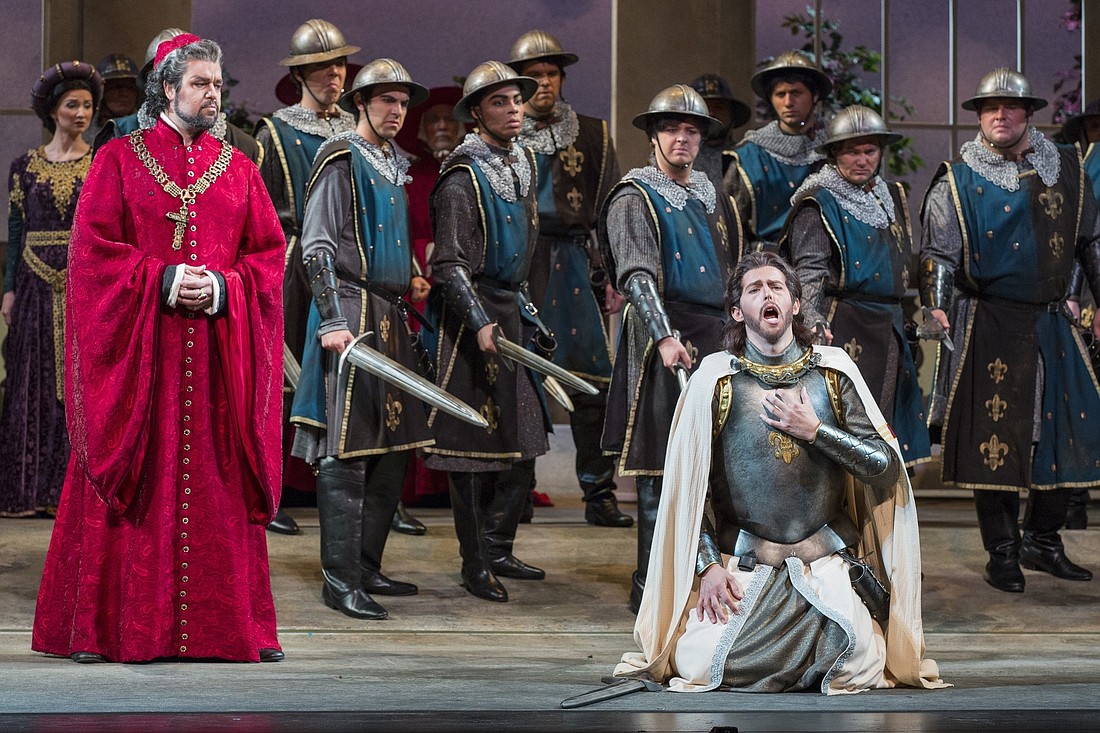- November 25, 2024
-
-
Loading

Loading

Few people have had the opportunity to see Verdi’s “Jérusalem.” Yet, if you were in the Sarasota Opera audience this past week, saw this rarely performed French opera and had that déjà-vu-all-over-again feeling, you were right. In 2011, you probably heard this Verdi work, set in Italy, sung in Italian and known as “I Lombardi.” Exactly the same? No. But close enough to jar our memories and make us think we’re hearing double.
Just four years after Verdi’s success in Italy with “I Lombardi alla prima crociata,” Verdi, with some help from a pair of French librettists, did a massive reworking of the earlier opera and adapted it under the name “Jérusalem” for a premiere in Paris. Both operas deal with the first Crusade but, rather than recounting the Lombard's connection, he gave it a Gallic perspective, changed some of the music, rewrote a bit of history and, voila, gave birth to a new(ish) opera.
To confuse the issue a bit more, Verdi also wrote an Italian version of the French “Jérusalem,” but it was the original French we heard this past weekend as conductor and Sarasota Opera Artistic Director Victor DeRenzi and Stage Director Martha Collins launched a new production as part of DeRenzi’s journey through his Verdi Cycle.
You may not get too much real history from either “Jérusalem” or “I Lombardi,” but you certainly get a sense of the brutality and barbarism — on all sides — of the Crusades. In “Jérusalem,” you also get a love story, treachery, mistaken identity, honor, deception and vengeance; all the things that make for great, grand opera.
But “Jérusalem” is more than grand opera. It’s a paean to honor and faith. The plot takes twists and turns that are totally implausible but, because the music draws us in, we’re transported from 11th century France to a mountain pass near Palestine, a harem in Ramla and, finally, the Crusaders’ camp near Jerusalem.
We become the royals of Toulouse, the Muslims of Ramla, the Christians of the first crusade and the believers Verdi sculpts us to be. He also gives us glimpses of things to come, as in the “Ave Maria” he’s given Jérusalem’s heroine, Helene, which predates Desdemona’s “Ave Maria” in his “Otello.” And he looks back at bit to “Nabucco” and its heroic choruses for many of the ensembles in this piece.
“Jérusalem” is about heroism and its characters are truly heroic, starting with the chorus, which is a character in itself. Whether they’re the men and women of Toulouse or the Arabs of Ramla, the chorus is an entity that carries “Jerusalem” along, powerfully persuading us to hang on their every note. From the second Act chorus that prays to God to find a way back from the desert to France, to the heroic sound of the final “Jérusalem,” we’re loyal to this group because they sing with such power and persuasiveness.
Along with the chorus, Verdi’s orchestra also plays a role of such importance, this opera wouldn’t be what it is without them. DeRenzi drew magnificent sounds from the trumpets and winds, making us forget, at times, that this was an opera and not a symphony. Verdi’s orchestration calls for wondrous sounds from the flutes and other winds, emulating the France of the Crusaders’ dreams. He also uses the trumpets as a call to arms, which the most peace-loving civilian would find hard to resist. Best of all, he uses silences; moments when the soloists and choruses sing without accompaniment, emphasizing their characters and spiritual bereavement.
The large cast is also heroic with the stalwart Young Bok Kim, as Roger, the Count’s brother, who’s responsible for all the chaos that ensues in the four acts, leading the way with his resonant bass sounding better than we’ve ever heard him before. Whether he’s clad as the nobleman who desires his own niece and tries to kill for her hand, or a hermit seeking forgiveness for his sins, he’s amazingly believable in a role that has little credibility.
Danielle Walker, as Helene, is the epitome of a strong, magnificent woman who will go to any lengths to stand by her man, even when the world stands against him. She seems to grow with the part, starting as a pretty young lady in love and winding up as a pillar of strength and faith, a force neither Christians nor Muslims can destroy. Her voice becomes more and more powerful as her characterization grows, making her one of the true heroes of this opera.
Matthew Hanscom makes a vocally and dramatically compelling Count of Toulouse, as does Jeffrey Beruan in his role as Ademar de Montheil, the Papal Legate. Heath Huberg, as Gaston, is dramatically persuasive but vocally inconsistent, perhaps because of opening-night jitters. Studio Artists Jon Jurgens, Ivan Conrad, William Roberts, Keith Brown and Catheryne Shuman and Apprentice Artist Gage Herrmann handled smaller roles well.
“Jérusalem” is as much a pageant as it is an opera, with each scene unfolding as another unbelievable but gripping chapter in a panorama that comes together in a musically blinding finale. Martha Collins’ staging does as much as can be done with the story, leaving the music to weave its magic. Ken Yunker’s lighting plays an important part in transfusing the sets by Jeffrey W. Dean with life. And Roger Bingaman’s work with the splendid chorus was transfixing. But the real hero of this rare epic is Verdi, a true man of the theater.